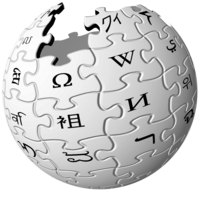Make More People Care
June 22, 2008 at 10:58 pm 1 comment
I don’t remember when I first heard about Wikipedia. It could have been six years ago, or maybe it was three. What I do remember was my dubious reaction. The idea of an encyclopedia editable by all seemed absurd – even stupid. Why leave the door open to the potential for complete inaccuracy?

But now I’m an occasional Wikipedia user and I think Wikipedia is a great free resource. So what changed my mind? It’s hard to say because it’s not as if I was even aware my mind had changed. Maybe it was the quality of the entries I stumbled across. It could have been the breadth and depth of topics the online encyclopedia covers. Perhaps I just had to get used to the idea of wikis themselves.
It’s likely that all of the above contributed to my change of mind. And after reading about Wikipedia for class, I’m only more convinced that the online, editable encyclopedia is providing a valuable service. It might not quite be the charitable humanitarian effort its founder, Jimmy Wales, envisions, but it’s become the fastest-growing reference work ever and an incredible example of how an online network of unpaid volunteers from across the world can pool knowledge and efforts to create an always-changing, living, breathing font of information.
My social media instructor asked us to consider whether we should trust Wikipedia or an expert-led encyclopedia more. My answer is that it depends. I actually think comparing Wikipedia to something like Britannica Online is comparing apples to oranges. Wikipedia is free and accessible to anyone with an internet connection. And for real-time information, it just can’t be beat. For better or for worse, Tim Russert’s Wikipedia page was updated with news of his death before any of the networks made the announcement. But if I had to do research for a paper or for a project at work, I wouldn’t rely solely on Wikipedia. I might use it as a starting point, though. The beauty of Wikipedia is that it requires citations, so following a Wikipedia page’s references to primary sources is a good way to track down information straight from the experts.
We were also asked how Wikipedia could be set-up to better provide accuracy. I started to brainstorm ideas, only to find that many of them are already in practice. Wikipedia’s organization and its system of checks and balances is a lot more structured than I had envisioned. For example, any user can put an article on his or her watch list, which records all changes to that entry. As a last resort, particularly controversial pages can be locked in the face of constant vandalism or editing wars.
Actual studies have shown that vandalism of Wikipedia articles, such as mass deletions or insertion of obscenities, are typically corrected by users who care in a matter of minutes. And according to Clay Shirky, author of Here Comes Everybody, “if enough people care enough about an article to read it, then enough people will care enough to improve it, and over time this will lead to a large enough body of good enough work to begin to take both availability and quality of articles for granted, and to integrate Wikipedia into daily use by millions.”
So my solution to providing better Wikipedia accuracy: Make more people care.
Entry filed under: Uncategorized. Tags: accuracy, Here Comes Everybody, social media, Wikipedia, wikis.
1. The NCLB Wikipedia Article’s Sordid History « Melissa’s Musings | July 6, 2008 at 11:04 pm
[…] the very opposite happened. This exercise showed me that Wikipedia really does work because people care enough to fix mistakes and constantly make improvements. I really believe that as long as people […]